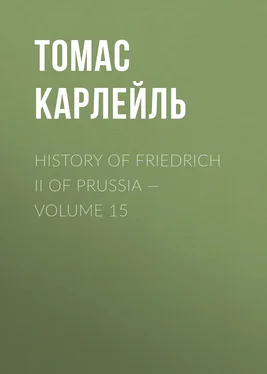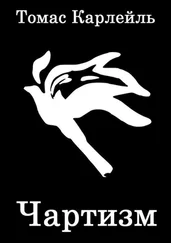Томас Карлейль - History of Friedrich II of Prussia — Volume 15
Здесь есть возможность читать онлайн «Томас Карлейль - History of Friedrich II of Prussia — Volume 15» — ознакомительный отрывок электронной книги совершенно бесплатно, а после прочтения отрывка купить полную версию. В некоторых случаях можно слушать аудио, скачать через торрент в формате fb2 и присутствует краткое содержание. Жанр: foreign_prose, История, literature_19, foreign_edu, foreign_antique, на английском языке. Описание произведения, (предисловие) а так же отзывы посетителей доступны на портале библиотеки ЛибКат.
- Название:History of Friedrich II of Prussia — Volume 15
- Автор:
- Жанр:
- Год:неизвестен
- ISBN:нет данных
- Рейтинг книги:5 / 5. Голосов: 1
-
Избранное:Добавить в избранное
- Отзывы:
-
Ваша оценка:
- 100
- 1
- 2
- 3
- 4
- 5
History of Friedrich II of Prussia — Volume 15: краткое содержание, описание и аннотация
Предлагаем к чтению аннотацию, описание, краткое содержание или предисловие (зависит от того, что написал сам автор книги «History of Friedrich II of Prussia — Volume 15»). Если вы не нашли необходимую информацию о книге — напишите в комментариях, мы постараемся отыскать её.
History of Friedrich II of Prussia — Volume 15 — читать онлайн ознакомительный отрывок
Ниже представлен текст книги, разбитый по страницам. Система сохранения места последней прочитанной страницы, позволяет с удобством читать онлайн бесплатно книгу «History of Friedrich II of Prussia — Volume 15», без необходимости каждый раз заново искать на чём Вы остановились. Поставьте закладку, и сможете в любой момент перейти на страницу, на которой закончили чтение.
Интервал:
Закладка:
That second plan would have been the wisest:—then why not, follow it? Too tame a plan for the youthful mind. Besides, we perceive, as indeed is intimated by himself, he dreaded the force of public opinion in France. "Aha, look at your King of Prussia again. Gone to conquer Bohemia; and, except the Three Circles he himself is to have of it, lets Bohemia go to the winds!" This sort of thing, Friedrich admits, he dreaded too much, at that young period; so loud had the criticisms been on him, in the time of the Breslau Treaty: "Out upon your King of Prussia; call you that an honorable Ally!" Undoubtedly a weakness in the young King; inasmuch, says he, as "every General [and every man, add we] should look to the fact, not to the rumor of the fact." Well; but, at least, he will adopt his own other notion; that of making for the Passes of the Bohemian Mountains; to abolish Bathyani at least, and lock the door upon Prince Karl's advent? That was his own plan; and, though second-best, that also would have done well, had there been no third.
But there was, as we hinted, a third plan, ardently favored by Belleisle, whose war-talent Friedrich much respected at this time: plan built on Belleisle's reminiscences of the old Tabor-Budweis businesses, and totally inapplicable now. Belleisle said, "Go southeast, not southwest; right towards the Austrian Frontier itself; that will frighten Austria into a fine tremor. Shut up the roads from Austria: Budweis, Neuhaus; seize those two Highroad Towns, and keep them, if you would hold Bohemia; the want of them was our ruin there." Your ruin, yes: but your enemy was not coming from Alsace and the southwest then. He was coming from Austria; and your own home lay on the southwest: it is all different now! Friedrich might well think himself bewitched not to have gone for Cham and Furth, and the Passes of the Bohmer-Wald, according to his own notion. But so it was; he yielded to the big reputation of Belleisle, and to fear of what the world would say of him in France; a weakness which he will perhaps be taught not to repeat. In fact, he is now about to be taught several things;—and will have to pay his school-wages as he goes.
FRIEDRICH, LEAVING SMALL GARRISON IN PRAG, RUSHES SWIFTLY UP THE MOLDAU VALLEY, UPON THE TABOR-BUDWEIS COUNTRY; TO PLEASE HIS FRENCH FRIENDS
Friedrich made no delay in Prag; in haste at this late time of year. September 17th, on the very morrow of the Siege, the Prussians get in motion southward; on the 19th, Friedrich, from his post to north of the City, defiles through Prag, on march to Kunraditz,—first stage on that questionable Expedition up the Moldau Valley, right bank; towards Tabor, Budweis, Neuhaus; to threaten Austria, and please Belleisle and the French.
Prag is left under General Einsiedel with a small garrison of 5,000;—Einsiedel, a steady elderly gentleman, favorite of Friedrich Wilhelm's, has brief order, or outline of order to be filled up by his own good sense. Posadowsky follows the march, with as many meal-wagons as possible,—draught-cattle in very ineffectual condition. Our main Magazine is at Leitmeritz (should have been brought on to Prag, thinks Friedrich); Commissariat very ill-managed in comparison to what it ought to be,—to what it shall be, if we ever live to make another Campaign. Heavy artillery is left in Prag (another fault); and from each regiment, one of its baggage-wagons. [ Helden-Geschichte, i. 1083; Orlich, ii. 41 et seqq.; Frederic, iii. 59; &c.] "We rest a day here at Kunraditz: 21st September, get to the Sazawa River;—22d, to Bistritz (rest a day);—26th, to Miltschin; and 27th, to Tabor:"—But the Diary would be tedious.
Friedrich goes in two Columns; one along the great road towards Tabor, under Schwerin this, and Friedrich mainly with him; the other to the right, along the River's bank, under Leopold, Young Dessauer, which has to go by wild country roads, or now and then roads of its own making; and much needs the pioneer (a difficult march in the shortening days). Posadowsky follows with the proviant, drawn by cattle of the horse and ox species, daily falling down starved: great swearing there too, I doubt not! General Nassau is vanguard, and stretches forward successfully at a much lighter pace.
There are two Rivers, considerable branches of the Moldau, coming from eastward; which, and first of them the Sazawa, concern us here. After mounting the southern Uplands from Prag for a day or two, you then begin to drop again, into the hollow of a River called Sazawa, important in Bohemian Wars. It is of winding course, the first considerable branch of the Moldau, rising in Teutschbrod Country, seventy or eighty miles to east of us: in regard to Sazawa, there is, at present, no difficulty about crossing; the Country being all ours. After the Sazawa, mount again, long miles, day after day, through intricate stony desolation, rocks, bogs, untrimmed woods, you will get to Miltschin, thence to Tabor: Miltschin is the crown of that rough moor country; from Prag to Tabor is some sixty miles. After Miltschin the course of those brown mountain-brooks is all towards the Luschnitz, the next considerable branch of the Moldau; branch still longer and more winding than the Sazawa; Tabor towers up near this branch; Budweis, on the Moldau itself, is forty miles farther; and there at last you are out of the stony moors, and in a rich champaign comfortable to man and horse, were you but once there, after plodding through the desolations. But from that Sazawa by the Luschnitz on to Budweis, mounting and falling in such fashion, there must be ninety miles or thereby. Plod along; and keep a sharp eye on the whirling clouds of Pandours, for those too have got across upon us,—added to the other tempests of Autumn.
On the ninth day of their march, the Prussians begin to descry on the horizon ahead the steeples and chimney-tops of Tabor, on its high scarped rock, or "Hill of Zisca,"—for it was Zisca and his Hussites that built themselves this Bit of Inexpugnability, and named it Tabor from their Bibles,—in those waste mountain regions. On the tenth day (27th September), the Prussians without difficulty took Tabor; walls being ruined, garrison small. We lie at Tabor till the 30th, last day of September. Thence, 2d October, part of us to Moldau-Tein rightwards; where cross the Moldau by a Bridge,—"Bridge" one has heard of, in old Broglio times;—cross there, with intent (easily successful) to snatch that "Castle of Frauenberg," darling of Broglio, for which he fought his Pharsalia of a Sahay to no purpose!
Both Columns got united at Tabor; and paused for a day or two, to rest, and gather up their draggled skirts there. The Expedition does not improve in promise, as we advance in it; the march one of the most untowardly; and Posadowsky comes up with only half of his provision-carts,—half of his cattle having fallen down of bad weather, hill-roads and starvation; what could he do? That is an ominous circumstance, not the less.
Three things are against the Prussians on this march; two of them accidental things. FIRST, there is, at this late season too, the intrinsic nature of the Country; which Friedrich with emphasis describes as boggy, stony, precipitous; a waste, hungry and altogether barren Country,—too emphatically so described. But then SECONDLY, what might have been otherwise, the Population, worked upon by Austrian officials, all fly from the sight of us; nothing but fireless deserted hamlets; and the corn, if they ever had any, all thrashed and hidden. No amount of money can purchase any service from them. Poor dark creatures; not loving Austria much, but loving some others even less, it would appear. Of Bigoted Papist Creed, for one thing; that is a great point. We do not meddle with their worship more or less; but we are Heretics, and they hate us as the Night. Which is a dreadful difficulty you always have in Bohemia: nowhere but in the Circle of Konigsgraz, where there are Hussites (far to the rear of us at this time), will you find it otherwise. This is difficulty second.
Читать дальшеИнтервал:
Закладка:
Похожие книги на «History of Friedrich II of Prussia — Volume 15»
Представляем Вашему вниманию похожие книги на «History of Friedrich II of Prussia — Volume 15» списком для выбора. Мы отобрали схожую по названию и смыслу литературу в надежде предоставить читателям больше вариантов отыскать новые, интересные, ещё непрочитанные произведения.
Обсуждение, отзывы о книге «History of Friedrich II of Prussia — Volume 15» и просто собственные мнения читателей. Оставьте ваши комментарии, напишите, что Вы думаете о произведении, его смысле или главных героях. Укажите что конкретно понравилось, а что нет, и почему Вы так считаете.









